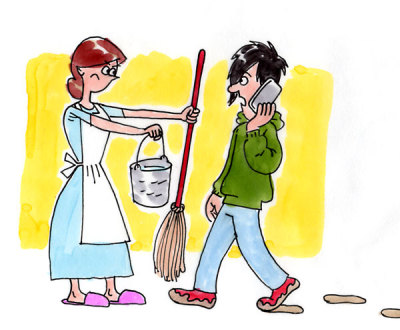Raising boys: The swing from blame to shame

This swing from blame to shame is one that boys make often. They struggle to get to the healthy middle space of taking ownership and rebuilding anything that needs repairing.
Just yesterday I met with a family navigating divorce. The father has had two affairs. The second one was discovered when his oldest son found a photo of his dad kissing another woman. When the truth came out, he said to his son, “I’m sorry you found that,” but he never said, “I’m sorry I did that.” He, like many boys, was more concerned about getting caught than what he’d done wrong. Unless boys learn to land in the healthy middle ground of ownership, they can stay stuck swinging between blame and shame for a lifetime. If he can’t get to ownership, he certainly can’t move toward repair.
To help Jake move in that direction, we spent time imagining what the father was experiencing in asking Jake to postpone the conversation until he was in a better head space and Jake’s plowing right through his request. We unpacked Jake’s accusations, declarations, and assumptions. I asked him to brainstorm what he could have done besides texting when he felt alarms going off inside of him.
Time and space
Jake was willing to take this journey with me. It’s important to note that he’d had some time between the incident and our conversation. Time and space can change the game for all of us. We often try to rush the connections or force the conversation before boys are ready. Anytime a parent or a child is in an emotionally charged space, it’s a bad time to do much talking.
Furthermore, it’s not a good time for discipline. Discipline is all about learning. We want kids to make the needed connections that allow for new behaviors next time. If they aren’t regulated, they can’t make the connections. If we aren’t regulated, we’re likely to shame, over-discipline, yell, or lecture.
Recognize. Regulate. Repair.
What Jake needed was the opportunity to think backward and forward. He needed to reflect on what he’d done to inform what he’d do next.
He didn’t need me to fill in the blanks for him, only to be a sounding board as he worked his way through what had happened and how this could inform the next time he got the news that wasn’t to his liking.
Part of thinking forward involved making decisions on how he wanted to talk with his girlfriend about the trust he’d broken with her parents. Thinking forward involved a plan of action for repairing the damage he’d done with her father.
Thinking forward involved locking in strategies to combat the impulsivity that every adolescent boy is vulnerable to experiencing at any given moment.
Thinking forward included finding a weekend when he could execute the plans he’d had in place for the original date. Boys who can’t look back and think forward are left with the emotion of the present. When boys let emotions drive the car, without factoring in thinking, the outcome can be dangerous. Technology has allowed boys to do many things, one of those being communicating immediately. He doesn’t have to wait to call, text, post, tweet, or send. I would argue that technology has trained all of us against regulation and not toward it.
Fools find no pleasure in understanding
but delight in airing their own opinions. . . .To answer before listening — that is folly and shame.
Proverbs 18:2, 13
We have to train ourselves not to react in real-time because we certainly have the tools to do so. Furthermore, we have the instincts to do so. Scientists from the University of Bristol studied content posted on Twitter over 24-hour periods for four years. An analysis of 800 million tweets found analytical thinking didn’t begin to peak until after 6 in the morning, with a more impulsive, emotional mode of engagement peaking between three and four in the morning. This information serves as one more reason why teenagers benefit from charging their phones overnight in a central location and not in their bedroom. I’ve had countless parents report finding destructive texting, posting, and internet use in the middle of the night.
Regardless of the time of day, any one of us is more vulnerable to tweetstorm behavior when we post, text, tweet, or fire back a response in an emotionally charged moment. I’d argue that regulation is some of the most important emotional work we can do as adults to position ourselves to model and teach this to the kids we love. We can only take the kids we love as far as we’ve gone ourselves. If regulation is a hurdle for you as a parent, that’s the place to begin.
It’s difficult for kids to learn to be more responsive than reactive when they can’t see it in the adults they trust the most in this world.
David Thomas, LMSW, is the director of family counseling at Daystar Counseling in Nashville, Tennessee (daystarcounseling.com), and the coauthor of ten books, including his latest Raising Emotionally Strong Boys: Tools Your Son Can Build on for Life (June 2022, Bethany House) and companion workbook for boys 6-12 years, Strong and Smart: A Boy’s Guide to Building Healthy Emotions. He speaks regularly around the country and is a frequent guest on national television and podcasts. He is also the co-host of the top 10 parenting podcast “Raising Boys and Girls,” with more than two million downloads to date. Thomas and his wife, Connie, have a daughter, twin sons, and a yellow lab named Owen. You can follow David on Facebook and Instagram @raisingboysandgirls and find the latest parenting resources at raisingboysandgirls.com.



























